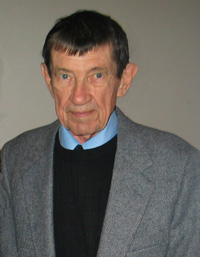 |
Joseph Gilmore, Ph.D., was instrumental in elevating the level of cardiovascular and renal research at UNMC to world-class levels. |
A native of Brooklyn, N.Y., Dr. Gilmore, 78, served as professor and chairman of the UNMC Department of Physiology and Biophysics from 1970 to 1987. Prior to coming to UNMC, Dr. Gilmore worked at the National Institutes of Health (NIH) in Bethesda, Md., and the University of Virginia College of Medicine, where he was acting head of the department of pharmacology and professor of physiology. Gilmore and his wife of 56 years, Harriet, retired to Tarpon Springs after Dr. Gilmore retired in 1987.
Dr. Gilmore was instrumental in elevating the level of cardiovascular and renal research at UNMC to world-class levels, said Irving Zucker, Ph.D., who worked under Dr. Gilmore at UNMC and succeeded him as chairman of the department (now called Cellular and Integrative Physiology).
“Joe was a hard taskmaster but a well respected scientist and administrator,” Dr. Zucker said. “He never shied away from telling it like it is. He trained many graduate students and post-doctoral fellows. I will always be grateful for him raising the bar and challenging me to excel, work hard and be enthusiastic about what I do.
“When we worked together in the lab, he made sure that everyone knew the great data he was accumulating by dragging the first person that walked by and showing him his latest hemodynamic recording. My success in science and as chairman over the past 35 years is a direct consequence of Joe Gilmore’s influence. I am extremely happy that he had created a named lecture and award to honor outstanding young scientists. I sincerely hope that this tradition will be perpetuated.”
The Joseph P. Gilmore Award was established by the department of physiology and biophysics upon Dr. Gilmore’s retirement in 1987 to recognize outstanding research contributions by young UNMC faculty members. It is awarded annually at a formal convocation and lectureship. Dr. Gilmore came to Omaha this year to present this year’s award on March 20 to Anuja Ghorpade, Ph.D., associate professor, department of pharmacology and experimental neuroscience.
Dr. Gilmore obtained the first NIH training grant at UNMC. He is best known for two areas of research, Dr. Zucker said. One was developing an early description of the determinants of oxygen consumption by the heart. This work led to improved therapeutics for patients with impaired coronary blood flow. The second area of Dr. Gilmore’s research involved his expansion of the knowledge base on the mechanisms by which the heart, the nervous system and the kidneys interacted to control blood volume, an area critical for the comprehensive treatment of patients with chronic heart failure.
Dr. Gilmore, who earned his doctorate from George Washington University, was the author or contributor on more than 150 scientific papers and a number of scientific books. He was a Fellow of the American College of Cardiology and a member of numerous scientific societies, including the Society for Pharmacology and Experimental Therapeutics and the American Heart Association. Dr. Gilmore received a number of awards including the McIntyre Award for Excellence in Research and the University of Nebraska Award for Excellence in Research and Creativity Activity.
He is survived by his wife, Harriet; two daughters and sons-in-law, Dr. Cathleen (John) Dietz, of Lutz, Fla., and JoAnne (Tom) Grove, of Omaha; two sons and daughters-in-law, Dennis and Nancy Gilmore of Omaha, and Gerard and Cathy Gilmore of Bloomfeld, Colo.; two brothers, Daniel and Edward Gilmore, both of Brooklyn, N.Y.; and 10 grandchildren.
Memorials may be made to the J. P. Gilmore Distinguished Award Fund, University of Nebraska Foundation, 8712 W. Dodge Rd., Suite 100, Omaha, Neb. 68114.